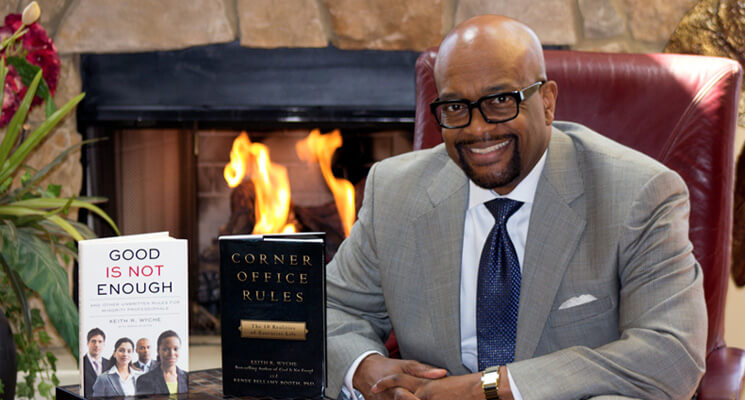From his modest executive office, the Stillwater, MN-based corporate headquarters of CUB Foods Inc., Keith Wyche oversees the $3 billion SUPERVALU Inc. division. He is responsible for 69 stores and more than 8,000 employees.
Since January 2010, Wyche has been president and CEO of CUB, bringing his track record of success in customer acquisition, satisfaction and retention, along with his change management skills to the retail grocery industry”. Skills honed in the previous thirty years, helping to sustain divisions of some the nation’s largest corporations – including AT&T, IBM and Pitney Bowes, during a series of industry booms and transformations.
Wyche’s title puts him in a lofty and fairly exclusive echelon of African-American corporate executives. He’s one of the highest ranking executives in the country. And, his business experience throughout his career makes him a leader with a menu of abilities that don’t pigeonhole him to a specific industry. He also includes mentor, author and motivational speaker in his portfolio of accomplishments.
Building Skills and a Reputation
The Cleveland native began his career after receiving his undergraduate degree from Cleveland State University. After the dismantling of the Bell telecommunications giant in the 1980s, and as cellular technology went viral in the ’90s – before ‘viral’ was all the rage — Wyche was becoming known not only as a can-do but a go-to guy for weathering storms of industry change.
Wyche furthered his education with an MBA in systems technology from Baldwin Wallace College. His penchant for leading change came by default and several lemons-to-lemonade challenges. “Early in my career, many of the opportunities I got were things that weren’t working,” he recalls. “I got the worst territories handed to me and I’ve been in the worst business units. And when you go through a number of years of being given broken things to fix, you kind of create a talent for it. I didn’t set out 30 years ago to be this change-management leader; it’s just that I was given things that were broken that needed fixing. As a result, I built a reputation and a process for handling change.”
At the time, it seemed logical that Wyche’s career path would take him to a leadership role within a technology firm, emerging dot-com, or any of the buffet of top communications corporations. Instead, a grocery-store chain sought him out.
A Grocer Looking to Change
It’s safe to say that Wyche had little knowledge of the grocery industry, but, he explains, SUPERVALU wasn’t looking for someone who did. Rather, it was after a leader to help the corporation deal with the burgeoning competition and the diversity of its competitors. As growth, technology, and economics would have it, change had arrived at the front door of the grocery industry with the rise of such things as open-to-the-public wholesale clubs and supercenters where discount and big-box retailers began to offer groceries in addition to their normal non-food merchandise, creating one-stop-shopping markets. Hit with this onslaught, Wyche says, “SUPERVALU needed someone who had a change-management, customer-focus point of view. It wasn’t looking for someone to be a grocer; it had all the grocery knowledge in the world. I was not hired because of a grocery background; I was hired for a change management background.”.
Today, CUB. captures one-third of the Minneapolis/St. Paul market share, with Target and Walmart as two of its main competitors. There are 58 CUB Foods stores in the market.
It didn’t matter whether the change was from mainframe to PC, traditional wires to fiber optics and cellular technology, or a leap to the grocery industry. Wyche found some commutable fundamentals. “Change management is the process whereby a company has to transform itself because of factors either inside or outside the industry,” he says. “It’s really the process of changing and transforming the company from what it was to what it needs to be to compete in this new reality.”
In many ways, his previous experience of focus on client retention became interchangeable with his customer retention duties at CUB. Taking the helm of a business in an industry he hadn’t previously worked in, Wyche said part of getting acclimated and establishing his leadership presence meant turning to any company’s most prized possession: its human capital. He realized that much of the success of doing that lay in connecting with the 8,000 employees he would lead and the customer base he was responsible for retaining and growing.
“At the end of the day, at my level, it was more about my ability as a leader, as opposed to having hands-on grocery experience.” he says. “I did roll up my sleeves. I worked in the bakery department, I worked in the produce department, and I’ve been a cashier, because I wanted to understand what they felt,”
Leading and Creatiing New Leaders
For the man whose life lessons included his father telling him as a boy, “You have no excuse not to be successful,” Wyche found that to be successful as a leader meant helping to create new leaders. In fact, that process is how he defines leadership. “A corporate leader is someone who can take the resources of the company — the human capital and buildings – and bring it all together to get the most value out of that,” he notes. “I always say that the job of a leader, above all else, is to create other leaders and to get the best out of people.” In selecting the members of his team, he made sure he surrounded himself with “the best and the brightest.”
Wyche has heard the stories of racial and ethnic disparities in corporate leadership roles and has been fortunate enough to be on the positive side of the statistics. This, he says, inspires him to reach back and offer advice to others climbing the ladder, especially minorities. While he understands that some groups have one (sometimes two) up on other groups, he still adheres to the “no excuses” philosophy. “From any level, the demands and qualities of leadership are the same,” he says, adding that, there can often be splinters and grease on the corporate and leadership ladder some minorities climb. And minority representation at the top is still an evolving event: in 1995 there were no African-American CEOs at Fortune 500 companies. Today, there are at least 11. “Many times, we didn’t have the role models growing up to help us navigate corporate America,” Wyche says. “As we’ve not been in leadership roles as long, the scrutiny can be a lot greater, the margin of error a lot slimmer. I feel an immense amount of pressure to be successful because we don’t have a lot of African-American leaders in the grocery industry. I’m measured on the same yardstick as my peers, but I think the reality of it is, when you’re a person of color, you do have the added challenge of making sure that you can’t fail.”
He gives thanks to his employer for adding to his success. “SUPERVALU has allowed me to be stretched in areas I’ve never been stretched in,” he says. “ It has given me an opportunity to learn a new industry, to reinvent myself, and that’s a big win for Keith Wyche.”
He also believes SUPERVALU scored a win, too: “It brought someone from the outside who has a unique view of the business, who looks at it from a customer-centric focus as opposed to a grocery-centric focus, someone who is not afraid to ask questions.”
Wyche says he learned early on that in managing your career, there are three things to keep a bird’s eye on: your performance, your exposure, and your perceptions. “Too often, people really only manage the performance piece and they don’t realize that the exposure and the perception are equally important because in this business, no one breaks through the glass ceiling by themselves,” he notes. “Someone on the other side has to see you, recognize you, and pull you through.”
Once he embraced that idea, Wyche says, “My career took off.” This was after several frustrating career events in which he thought he should and would have been promoted, only to find that he wasn’t and wouldn’t be. A business associate showed him some of the errors of his professional ways; chief among them was not branding himself. “I had to have a brand so that people knew what to expect and what not to expect from me,” he says.
His brand is all over the pages of his book, Good Is Not Good Enough: And Other Unwritten Rules For Minority Professionals, and prominent on his speaking circuit. Most importantly, it has been a boon for his role at SUPERVALU. Even when he’s vacationing, Wyche says, he’s thinking of ways to further lead his division.
“Good is the enemy of great,” he says. “If you focus on the good, you’ll miss out on the better. and you’ll never get to your best.”








